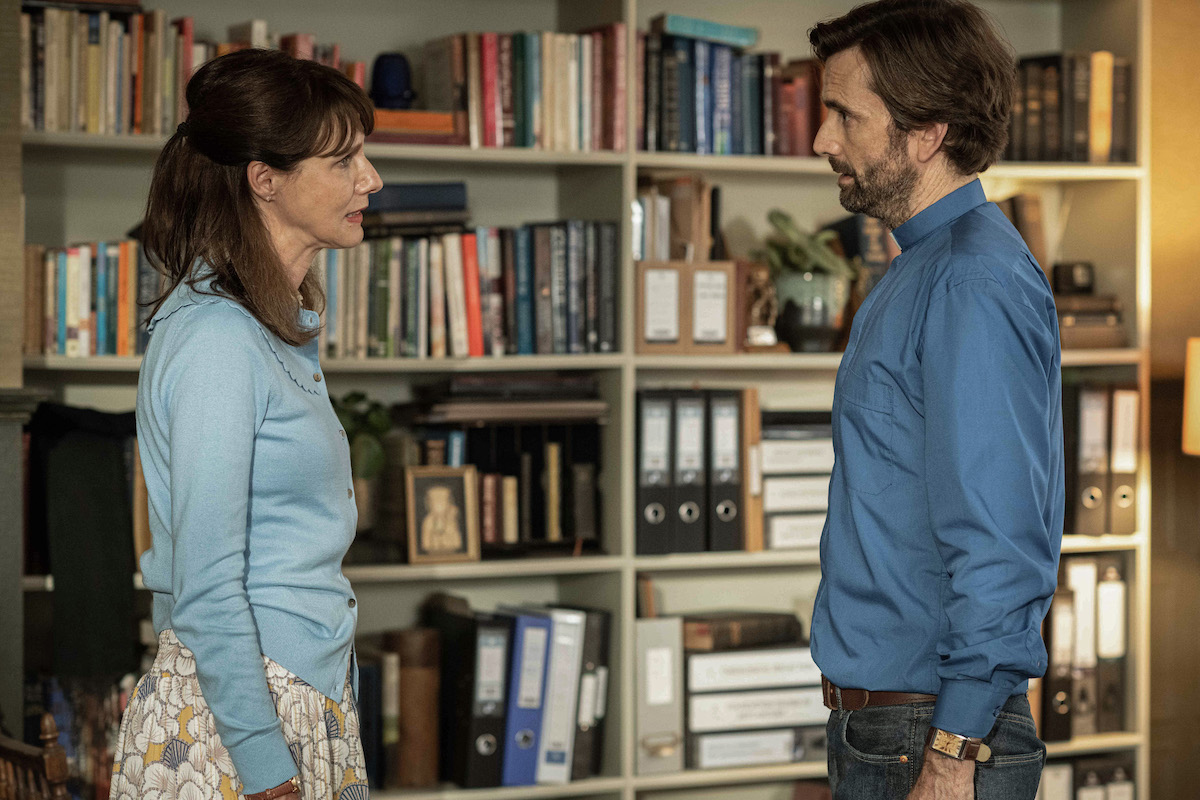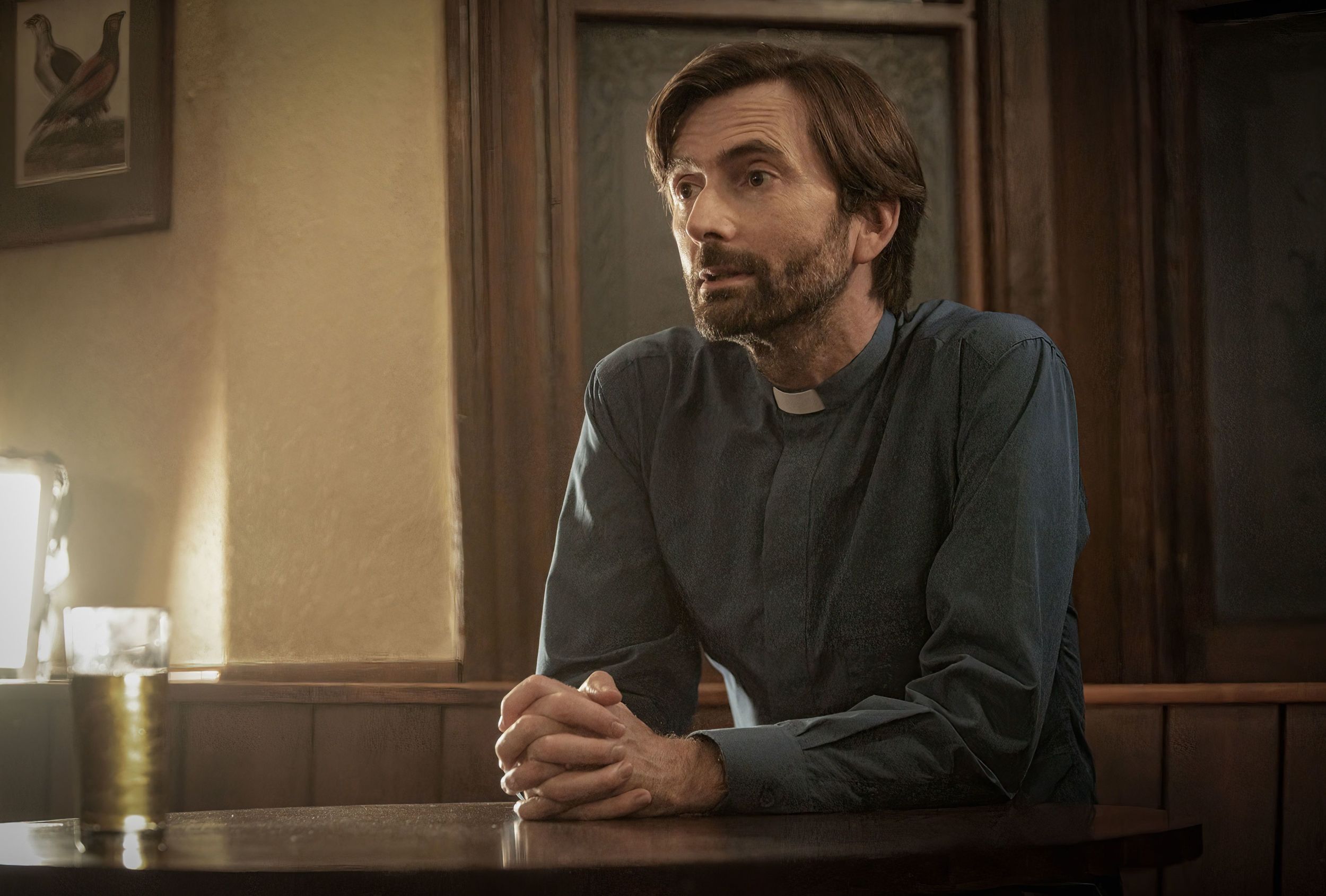Better Late Than Never: 'Inside Man' Is a Messy, Propulsive Morality Play

David Tennant in "Inside Man"
(Photo: Netflix)
Editor's Note: Life is short, and Peak TV is vast. Our Better Late Than Never feature series is here to help us all catch up on some of the shows and movies we've probably all missed out on in the past year or two simply because we've been watching something else. Join the Telly Visions writers as we celebrate our underrated faves and finally understand what all the fuss was about the shows we hadn't actually managed to see yet.
Despite its A-list cast and buzzy British pedigree, the Netflix series Inside Man arrived with relatively little fanfare in the Fall of 2022. The streamer announced the series' premiere mere days before it dropped on the service and gave it laughably little promotion. (If memory serves, Netflix never even released a trailer for it!) Given that the series hailed from writer/creator Steven Moffat (Sherlock) and starred popular actors like David Tennant (Good Omens) and Stanley Tucci (Citadel), you'd think it would be, if not a surefire hit, at least a property the streamer might want to let people know existed.
On the other hand, it might be just as likely that Netflix simply didn't know what to do with the series, which is surprisingly dark and uncomfortable and tinged with no small amount of stark gallows humor. A show that features a pair of standout performances but a story that's painfully unsatisfying and frustrating by turns, it introduces complicated themes but never takes them quite as far as you might hope. Yes, like so many Moffat shows before it, Inside Man is kind of a mess. But its relentless pace and truly bonkers (often nonsensical) plot at least makes for an entertaining ride.
The premise at the heart of Inside Man is an intriguing one: the idea that anyone is capable of doing something genuinely terrible, and can even become a murderer if presented with the right set of circumstances. Or, "a good reason and a bad day," as the show itself puts it. And Inside Man certainly does its best to show us the gulf between unrepentant killers and upstanding citizens is not as wide as we might like to believe.
The story follows Jefferson Grieff (Tucci), a former criminologist and American death row inmate who spends his days awaiting execution and helping solve legal cases he believes to be of "moral worth". He's even got his own pseudo-Watson in the form of the serial killer (Atkins Estimond) with a photographic memory in the cell next door, and claims to take on these projects in a sort of roundabout way to help atone or, at the very least, to do some good in the world before he's justly punished for the bad he's done.
Meanwhile, in England, charming suburban vicar Harry Watling (Tennant) is caught up in a horrifying series of cascading misunderstandings while trying to protect a parishioner who's both committing a dark sin and suffering from an abusive home life. His choice kicks off a chain of events that ultimately leads to him being caught up in a child pornography case and locking his son's math tutor Janice (Dolly Wells) in the basement. If this sounds insane, that's because it is, and the only way you're going to be able to enjoy Inside Man is to accept the utter ludicrousness of its initial set-up.
A truly Olympian amount of suspension of disbelief is required in the series' first episode, simply because of the sheer number of wildly stupid decisions that are made by various characters and all too convenient twists that result,most of which could have been easily avoided if anyone at any point decided to simply tell the truth. As Harry frets over what to do about the woman he's now holding prisoner and how to protect his family, a British journalist named Beth Davenport (Lydia West) who's in America to do a story on Grieff informs him about her suddenly missing "friend" and sets the Death Row Detective on Janice's case. That he'll figure out what's happening feels like a foregone conclusion, and the only real question is how bad things will get in Harry's house before they do. (Answer: Pretty darn bad.)
Unfortunately, despite its willingness to embrace dark themes and poke at genuinely thorny ethical questions, Inside Man is ultimately plagued by many of the same problems we've seen pop up (repeatedly) in several of Moffat's other works. The story is endlessly convoluted, for little ostensible reason. Supposedly "clever" twists often rely on characters being the literal dumbest possible version of themselves at any given moment, and none of the women in this story have much in the way of genuine interiority. (Janice, in fact, is so annoying and ridiculous that I'd bet a fair amount of viewers were maybe sort of hoping Harry'd just leave her in his basement forever, and the series' final twist involving her character frustratingly rewrites basically everything we know about her character in the name of shock value.)
The series' split format also doesn't do it a lot of favors, often making it feel like we're watching two different shows fighting under a blanket without either getting the depth or focus it really deserves. (The tonal differences between the segments are also...something else.) And though the two disparate threads do finally manage to connect, it's as ridiculous as anything else about the show's story. (Given that Beth only seems to have maybe texted Janice a few times in the hopes of using her for a story, it feels like a stretch to even call the pair friends, let alone believe that she'd upend her life --- and solicit the help of a murderer --- to track her down.)
Had this show chosen to simply be a dark Sherlock Holmes remix, it might have had more space to wrestle with the question of why we're drawn to cerebral geniuses like this in the first place, so much so that we're willing to overlook the fact that Greiff is an unrepentant wife killer, who won't even tell the authorities where he left his dead wife's head after he severed it from her body. Had it decided to be a story about a fundamentally good man who makes a series of bad decisions out of a genuine desire to do the right thing, it might have managed to pad out its paper-thin plot with more genuine emotional heft. (There's so much to like about Harry, but we barely get to learn anything about him before he starts his tumble down the slippery slope of moral decline.)
All that said, the performances here are solid, especially Tucci, who's clearly having a ball as the uber-clever Death Row Detective with an almost clairvoyant ability to read people and who still somehow manages to maintain a global network of contacts and associates willing to do his bidding.
Tennant is also excellent, infusing Harry with an almost palpable longing to do --- and to be --- good, even as the situation around him continually spirals into darker and darker territory. For all that Harry's a vicar, Inside Man doesn't lean into his crisis of faith as much as it probably should --- the brief scenes in which he talks about his beliefs and the way they inform (and transform) his choices are some of the series' best. (Things I would love to know: how clearly devout Harry managed to marry a woman who mocks his faith as a fairytale. It's his literal job.)
But the series' brisk four-episode runtime is much more interested in building tension than fully exploring the moral questions it raises. And, to be fair, it's a bonkers ride, with a final hour that's got the whole race against the clock peril thing down, in ways that are almost unbearable to watch at times. The show is clearly hoping you'll be so busy gasping at the next wild narrative swerve that you won't think too hard about the various plot holes or inconsistencies you sped past along the way. And when it achieves that balance? It's honestly such fun. But try and turn your brain off (or at least to the lowest setting) first.
Inside Man is currently streaming on Netflix.







